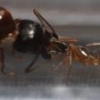Quick history; my L. alienus queen died not long after waking from hibernation, leaving a couple workers from last season and a small egg pile that went thru hibernation. After 2 - 3 weeks I introduced an L. umbratus queen, and the two workers accepted her. Lost one worker due to drowning, so down to one.
Here's the behaviour I observed last night. The L. umbratus queen was significantly more active than normal. Typically she moves around a bit here and there, but she was moving around the tube quite a bit. I noticed she was taking a very specific size of larvae in her mandibles, would feverishly move it around in her mandibles, her antenna furiously moving as well, then put it down. Sometimes place it away from the rest of the brood pile. In the time I watched she did this probably 6 or 7 times (I had a toddler on my lap, so could only watch so much.) The worker would follow her, pick the larvae back up, and put it back. There are several sizes of larvae, and she seemed to be only selecting one specific size to rearrange. My first inclination was she was eating them, but she looked to be carefully moving them around in her mandibles before moving them around the tube under the foil with their food.
This is my first season with Lasius, none-the-less a parasitic queen. Not sure if this behaviour is typical. Thanks!
Edited by noebl1, May 14 2017 - 7:42 AM.














